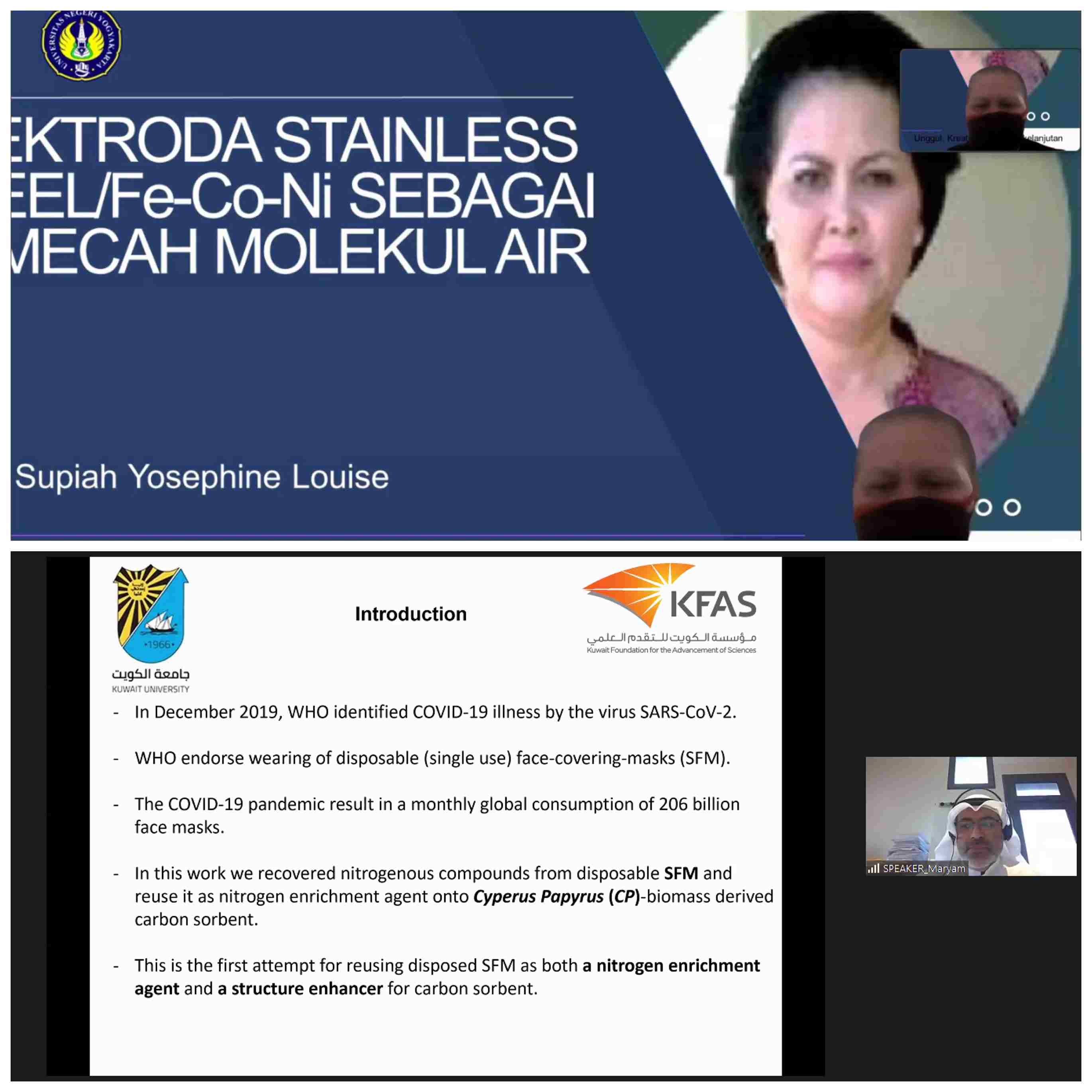 Bahasa Indonesia
Bahasa Indonesia English
English
You are here
WEBINAR SERIES #1 DEPARTMENT OF CHEMISTRY EDUCATION, 2022

Friday, October 7 2022, the Department of Chemistry Education, FMIPA UNY has held Webinar Series #1 in the context of the 66th Anniversary of the Chemistry Department of FMIPA UNY with the theme "Synergistic in Chemistry Education in Supporting the Post-pandemic Era" by inviting educational expert speakers. This webinar, which was held online via Zoom Meeting, was attended by 144 participants including teachers, students, lecturers and educational practitioners. Prof. Dr. Jaslin Ikhsan, PhD as Deputy Dean for Academic Affairs and Cooperation FMIPA UNY gave his speech as part of the opening of Webinar Series #1. On this occasion, the Chemistry Education Department, FMIPA UNY presented Prof. Dr. Isana Supiah Y.L. from the Faculty of Mathematics and Natural Sciences, Yogyakarta State University and Prof. Ali Bumajdad, Ph.D from Kuwait University.
The first material was delivered by Prof. Dr. Isana Supiah Y.L about "Stainless Steel/Fe-Co-Ni Electrodes as Breakers of Water Molecules". As is known, water and liquid waste are abundant on earth, so using them as energy sources is a challenge in itself. Water molecules can be broken down into hydrogen and oxygen gases in various ways. Hydrogen gas is an environmentally friendly fuel, which is suitable to replace fossil fuels, which are increasingly in short supply in nature, so efforts related to providing renewable energy need to receive support from various parties. The electrolysis process is one way to break down water molecules into hydrogen and oxygen gases, but in general it still has low effectiveness. Therefore, efforts are needed to increase the effectiveness of electrolysis, both in terms of the electrodes and the electrolyte used
As for Prof. Ali Bumajdad delivered the second material entitled Reuse of Disposable COVID-19 Surgical Masks as a Nitrogen-Enrichment Agent and Structure Promoter for a wild Plant-Derived Nano-Sorbent. Prof. Ali Bumajdad explained that the available wild plant biomass (Cyperus papyrus/ CP) was chosen as the raw material for making adsorbents. The ''green-etching'' process is used to synthesize adsorbents with significant modifications without using any chemicals. As observed through characterization analysis, after mixing SFM with CP at a weight ratio of 1:1, there was a considerable development in the specific surface area (SBET = 830 m2/g) for micropores (0.333 cm3 /g) and me (0.053 cm3 /g) as well as various functional groups (for example, amino and carbonyl) in the resulting sorbent. This is the ability of adsorbents to remove various pollutants from aqueous solutions. The adsorption capacity of heavy metal ions (Cr(VI)) was used to identify optimum adsorption parameters. In addition, solid mask residue can change the composition of the carbonaceous material if done well and thereby improve absorption properties. These results can be used as a basis for decision making in managing plastic waste which has soared during the COVID-19 pandemic
The interactive discussion between the resource person and the Webinar series #1 participants is an indication that the material presented by the resource person is relevant to the participants' work activities. In this way, it is hoped that Webinar Serien #1 can become a means of learning together to improve the quality of more varied learning. Furthermore, the Chemistry Education Department, FMIPA UNY still has Webinar Series #2 which will be held on Friday, October 14 2022, see you! :)
Sistem Informasi
Kontak Kami
Program Studi Pendidikan Kimia
FMIPA Universitas Negeri Yogyakarta
Gedung Dekanat D.07 FMIPA UNY
Kampus Karangmalang Yogyakarta 55281
Telp. (0274)586168 Pes. 115
Email: pend_kimia@uny.ac.id
Copyright © 2024,
